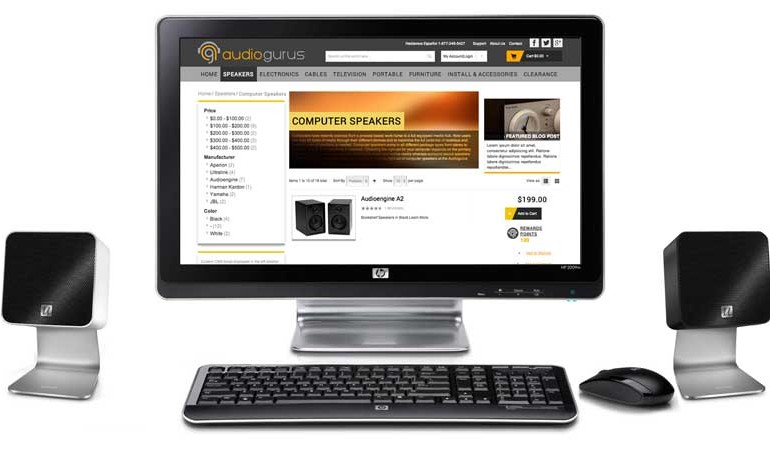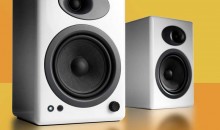Choosing the Best Computer Speakers
Whenever I walk into someone’s office I’m faced with the same need to restrain myself. From what, you ask? From criticizing their choice of computer speakers. It’s nearly universal, too. All of my friends started off with a sub-par set of computer speakers to begin with, but then compound the problem with poor placement and a lack of attention to just how these systems are designed to function optimally. Just about ANY set of computer speakers is going to outplay the speakers on your laptop or computer, so the issue isn’t so much that these speakers are inherently awful—it’s just that I see a lot of mistakes people make when choosing them and certainly when placing them on their desk. This article only gives time and attention to the first issue: buying the best computer speakers for your desk or office. I’ll cover the placement and configuration tips in another article. Let’s start with some pre-shopping tips in the form of questions you should ask yourself when purchasing computer speakers.
What Are You Trying to Achieve?
This question might be better phrased as “What are these speakers being used for?” I’ve seen musicians with $99 desktop speakers (including a sub, mind you) who are using them to mixdown tracks and master albums. It’s uncanny. I don’t care how great the review of that hollow plastic “full-range” speaker was—there’s no place for it in professional use. It doesn’t have the capacity to tell you the truth about what you’re hearing. It may sound decent, but it’s not going to sound accurate.
So if you’re just looking for the best system to enjoy music and movies while you work, you’re in a very different place from the worship leader looking to master a drum track for the Sunday service, or the independent filmmaker trying to edit together videos for a project. This may seem self-explanatory except that I’ve seen products misused for applications in which they were never attended to be utilized.
What’s Most Important to You In Terms of Sound Quality?
I call this the “Are you a bass-head?” question. Lots of my friends really like bass and they don’t care if it’s boomy. They simply don’t appreciate anything that doesn’t carry some weight on the bottom end. I can sympathize. For years I heard it said that the center channel was the most important speaker in a 5.1 system. Hogwash. I’ll take you into a room with a great center channel and then we’ll visit a theater with no center channel and a huge subwoofer.
You’ll pick the sub every time.
A good center channel speaker provides clarity and better intelligibility to a movie. A subwoofer completely changes the experience. The same can be said for midrange capabilities in computer speakers and a subwoofer. I’m through trying to convince people that better clarity and less distortion is better than more low-end. I’ve learned to simply ask and watch for their response. If their eyes light up when you mention the word “subwoofer”, then don’t think for a second you can recommend the world’s best desktop speakers…that only play down to 120 Hz.
How Much Desk Space Do You Have?
You can also ask yourself: “Can I use speaker stands next to my desk?” If you have the room, then a larger set of speakers can really up the ante in terms of sound quality. Some of the best computer speakers I’ve heard were actually more akin to studio monitors placed on or around a desk. If we want to constrain the discussion to true computer speakers, then we’ll likely have to forgo studio monitors and stands and really hone in on the desktop models available on the market today. Still, desk real estate could be a major issue for some, and it could mean the difference between larger 2.1 systems and speakers with more space savings in mind.
Where Will You Place Your Subwoofer?
Similar to the above question is “Can I fit a subwoofer in the room or under the desk?” I sure hope you can because it really enhances the quality of sound. A subwoofer, even a small one, takes away responsibilities from the main speakers to free them up for the higher frequencies. The trouble with a subwoofer is two-fold, however: 1) Can you place it in the room or under the desk? And 2) Will it disturb your co-workers if you actually use it? For the second issue, volume control can typically solve any problems. The sub, even if not cranked, can even out the sound and result in a better listening experience for everyone. On the first issue, placing the sub underneath the desk will certainly be the best way to conceal it, but it may not be the best location for sound. If your desk is against the wall you may find that you can easily extend the cabling to locate the subwoofer elsewhere. Maybe towards a corner of the room or anywhere else it produces a more consistent sound across its entire frequency range.
Do You Need a Ton of Inputs or Control?
Most people who need a good pair of computer speakers only need a single input for their laptop or desktop computer. There are cases where you might want to multi-purpose your system or simply be able to slap up an iPod or other MP3 player from time to time. An Aux input will be needed in order for this to be (easily) possible. Another frequent need is for a pair of headphones to be connected conveniently and quickly when needed. I’ve seen lots of systems that lack a headphone jack on one of the speakers. This means you cannot easily connect and use headphones without having to access another output on your computer or disconnect your speakers. If you think this might be a need then ensure there is a headphone jack on any speakers you consider.
Surround Sound and Computer Speakers
There are certainly computer speakers that have the ability to do surround sound. Some of them are quite nifty, in fact—with sophisticated control systems and optical digital inputs to facilitate connectivity to gaming systems. In our opinion, these are neat, but if there is any way you can slide into a true home theater in-a-box (HTiB), then I always encourage that route. Most 5.1 gaming systems store the amplifiers in the subwoofer and cannot be upgraded. A HtiB will have an actual AV receiver, speakers, and subwoofer to allow upgrading of any of the components at a later date. That’s not to say I haven’t been blown away by some of these 5.1 gaming systems in a small space, but—as a frequent upgrader—I tend to take the path that lets me improve my system over time.
What to Listen For
Finally, I recommend auditioning speakers when you can. But even if you can’t, read the reviews. What you want is a system that doesn’t audibly distort at high volumes. A system that can be turned up without a ton of audible distortion means that it was designed well with respect to its amplifiers and drivers. That’s a great start! Next, you want to listen for high-frequency detail that isn’t shrill. You want mids that sound authentic (female and male vocals, as well as saxophones, are great for this). And if you are a bass-head, be sure the subwoofer doesn’t start flapping and popping at high levels of output.
Conclusion
I’m hoping this guide was helpful. Choosing the best computer speaker doesn’t have to be hard, but you need to know what you want in terms of features and what you have to take into account given your room and listening limitations. I love shopping for speakers because it gives me a chance to hear lots of different models, or read about what’s really hot on the market. Either way, you’re sure to get an education!
Are you shopping for computer speakers? If you are, let us know what you value the most. Is sound quality your number one concern? Or is it something different—like size or bass response? Let us know on Facebook or comment below and join in the discussion.






